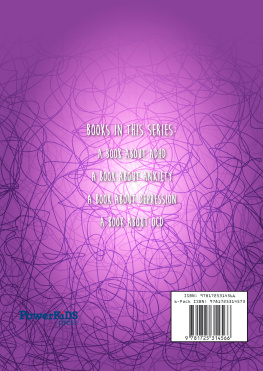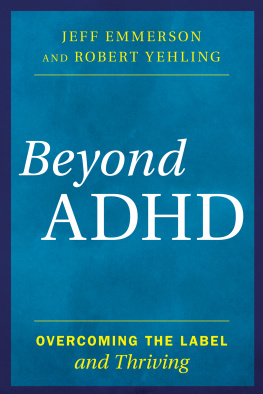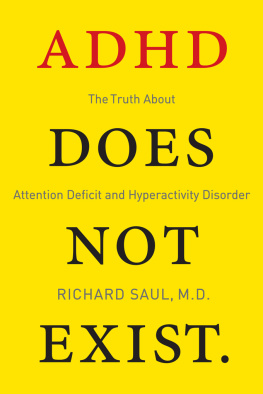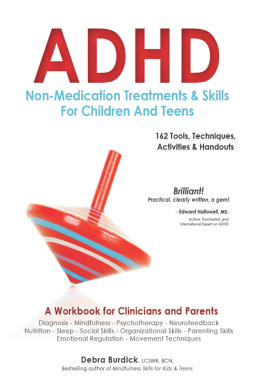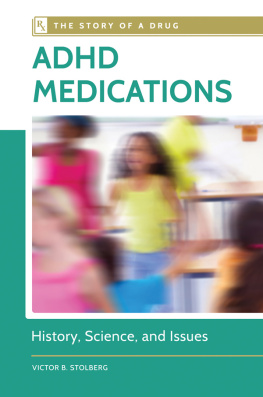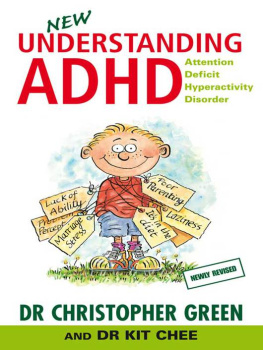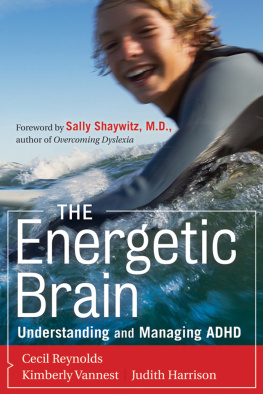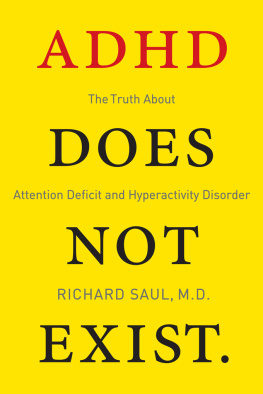The ADHD Explosion
The ADHD Explosion
Myths, Medication, Money, and Todays Push for Performance
STEPHEN P. HINSHAW
RICHARD M. SCHEFFLER


Oxford University Press is a department of the University of Oxford.
It furthers the Universitys objective of excellence in research, scholarship, and
education by publishing worldwide.
Oxford New York
Auckland Cape Town Dar es Salaam Hong Kong Karachi
Kuala Lumpur Madrid Melbourne Mexico City Nairobi
New Delhi Shanghai Taipei Toronto
With offices in
Argentina Austria Brazil Chile Czech Republic France Greece
Guatemala Hungary Italy Japan Poland Portugal Singapore
South Korea Switzerland Thailand Turkey Ukraine Vietnam
Oxford is a registered trademark of Oxford University Press
in the UK and certain other countries.
Published in the United States of America by
Oxford University Press
198 Madison Avenue, New York, NY 10016
Stephen P. Hinshaw and Richard M. Scheffler 2014
All rights reserved. No part of this publication may be reproduced, stored in a retrieval system, or transmitted, in any form or by any means, without the prior permission in writing of Oxford University Press, or as expressly permitted by law, by license, or under terms agreed with the appropriate reproduction rights organization. Inquiries concerning reproduction outside the scope of the above should be sent to the Rights Department, Oxford University Press, at the address above.
You must not circulate this work in any other form and you must impose this same condition on any acquirer.
Library of Congress Cataloging-in-Publication Data
Hinshaw, Stephen P.
The ADHD explosion : myths, medication, money, and todays push for performance/
Stephen P. Hinshaw, Richard M. Scheffler.
pages cm
Includes bibliographical references and index.
ISBN 9780199790555
1. Attention-deficit hyperactivity disorderTreatmentFinance. I. Scheffler,
Richard M. II. Title.
RJ506.H9H57 2014
616.858900835dc23
2013028792
9 8 7 6 5 4 3 2 1
Printed in the United States of America
on acid-free paper
To Kelly, Jeff, John, and Evan To Meg and Zach
Contents
ADHD is the most common childhood behavioral health problem leading to medical and behavioral health interventions. In fact, one in nine children and adolescents in the United States has received a diagnosis (including nearly one boy in six), and medication treatment is initiated for the vast majority of them. As with autism, its numbers have skyrocketed in recent years. ADHD medications are the number one medicine used worldwide for behavioral problems in youth.
Impressive evidence exists that children who exhibit ADHD behavior patterns suffer many difficulties in school and community adjustment, struggling to keep up academically. They also have disproportionate rates of later problems, from car accidents to substance abuse and divorce. Moreover, problems of hyperactivity, impulsivity, and inability to concentrate that become evident in school and home settings commonly persist in later life, compounding difficulties in successful adjustment. Because these behaviors often first become problematic when children face increased school expectations and demands, requirements for attention and concentration, and expectations of discipline and conformity, some critics see the problem as one of regimented and unimaginative schools that are too rigid to accommodate the varied needs of children.
Thus, ADHD is commonly viewed as a contested behavior, not a true disorder, serving the interests of schools in their need to maintain order, the pharmaceutical industry that seeks to sell as many drugs as possible, or the varying professions and clinicians who build their practices around treatment of these children. Although there is some truth to such claims, they present an incomplete and distorted story that often trivializes the pain, disruptions, and frustrations caused by this behavioral syndrome, underestimating the large personal and social costs for the children, their families, schools, and communities. They also ignore the fields increasing neurobehavioral understanding and the effectiveness of some treatments.
This book brings together an unusual collaboration between an outstanding clinical investigator of ADHD and other behavioral disorders (as well as mental illness stigma) with a distinguished health economist who has specialized over his career in the economics of mental disorders. Thus, this book is unique in its scope and perspectives in examining the wide range of influences that shape ADHD as a medical and social problem within the United States and elsewhere. It seeks to understand the major disparities in incidence and prevalence, family recognition and help-seeking, and access to medication and behavioral treatments. In fact, the chances of receiving an ADHD diagnosis are twice as high in Southern states (e.g., North Carolina) as in the Far West (e.g., California); Southern states are also more likely to medicate the disorder. There are major puzzles to solve in relation to ADHD, and this book tackles them head-on.
While addressing the major social and cultural issues affecting ADHD, the book encompasses Hinshaws clinical research and experience, grounding more abstract discussion in the everyday experiences of children, parents, teachers, doctors, and welfare personnel. It also benefits from Schefflers long-standing expertise in the world of health economics and public policy. It tackles global issues, far beyond the United States, revealing that ADHD diagnosis and medications have rapidly expanded around the world. This is a book that deals simultaneously with clinical realities and social policy.
Children with ADHD come to attention through the challenges faced by parents and teachers. Estimates of prevalence vary greatly because children are often labeled on the basis of behavioral styles appraised by untrained adults and not thorough clinical evaluations. Nevertheless, such labeling has been increasing over time, and ADHD is one of the most common diagnoses of children and adolescents as they proceed through their school experiences. How much of the expansion is a real increase in disorder, a reflection of growing definitional boundaries, a consequence of the changing nature of schooling and the focus on testing, stresses on teachers, or a response to advocacy and marketing of treatments remains a major puzzle.
Stimulants are the number-one medication class for children and adolescents, and their rates of prescription are climbing ever faster for adolescents and adults. Although still controversial, they have been useful to moderate the symptoms of ADHD. The rates of medication are huge, with more than 6% of all children receiving these medications. Ironically, combined treatments using both medication and behavioral treatment have been in decline despite their recognized value. This pattern follows trends in behavioral health care more generally, with greater dependence on pharmaceuticals and less availability of psychosocial treatments or rehabilitation, in order to contain costs.
As Hinshaw and Scheffler make clear, considerable debate continues about whether ADHD is a real disorder, a convenient way of describing some troublesome behaviors, or a reflection of our society and culture and the way we organize schools and learning. Like many other diagnoses in the
Next page

